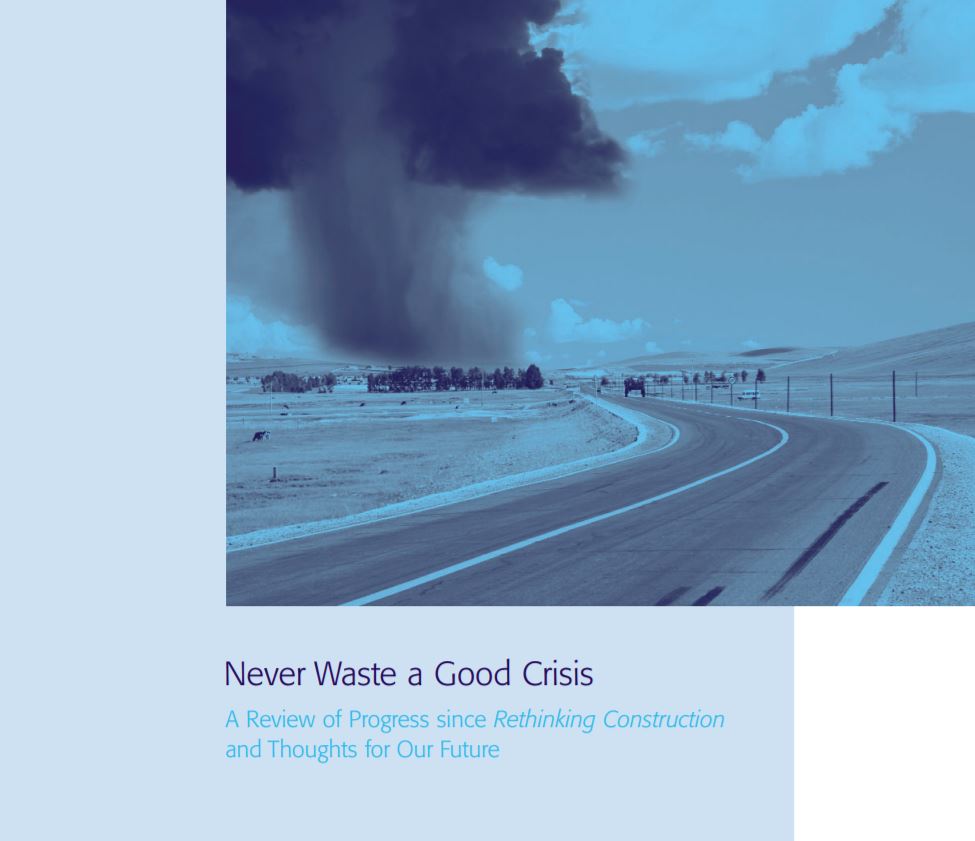Since Sir John Egan’s Task Force published its report Rethinking Construction in 1998, there has been
some progress, but nowhere near enough. Few of the Egan targets has been met in full, while most
have fallen considerably short. Where improvement has been achieved, too often the commitment to Egan’s principles has been skin-deep. In some sectors, such as housing, construction simply does not matter, because there is such limited understanding of how value can be created through the construction process.
For the last decade, the industry has been sheltered by a healthy economy. This has enabled construction to prosper without having to strive for innovation. The current economic crisis is a perfect opportunity for us to think again. We can not afford to waste it.
Looking ahead, there are major challenges on the horizon. Most clients have already cut their long-term investment plans, and capital budgets will be at risk for many years to come as we anticipate a long period of recovery from the current recession. For Government, there is huge pressure to reduce public spending. But perhaps the greatest challenge is how we can deliver a built environment that supports the creation of a low carbon economy for the UK. So while there is no crisis yet in our industry, we are approaching a time when UK plc can no longer afford to build and maintain, the infrastructure capable of supporting our future needs as a society.
So what will make the industry change now when it has failed to do so before? We believe that an essential step is for suppliers, clients and Government to adopt a new vision for the industry based on the concept of the built environment. This means understanding how value is created over the whole life cycle of an asset, rather than simply looking at the building cost, which is only a part of the total equation. It is about how the relatively small up-front costs of design and construction can have such huge consequences for future users, whether expressed as business or social outcomes, as well as for the environment.
The impact of this vision is potentially immense for our industry. We need to abandon our existing business models that reward short-term thinking. Instead, we should incentivise suppliers to deliver quality and sustainability by taking a stake in the long-term performance of a built asset.
How will this be achieved? We believe that the era of client-led change is over, at least for the moment, and that it is now time for the supply side to demonstrate how it can create additional economic social and environmental value through innovation, collaboration and integrated working – in short, the principles outlined in Rethinking Construction. Clients should focus instead on professionalising their procurement
practices to reward suppliers who deliver value-based solutions.
Government, as a client, needs to understand the enlightened thinking that better and more intelligent designs improve patients’ recovery in hospitals and learning outputs in schools. So, rather than reduce the number of schools and hospitals being built, it must sponsor smarter and more productive solutions and reduce the amount of money wasted on the procurement process. For Government as a policy maker, the challenge is to create an environment that incentivises innovation and speeds up the modernisation process.
There are other stakeholders with a key role to play. We need an education and training system that promotes holistic learning across disciplines, so that industry professionals are equipped with an understanding of how better integration delivers value. We also need industry bodies and professional associations to cooperate better to represent our industry effectively to Government and the public.
Above all, we need leaders who can engage the public and key stakeholders about the ‘new value’ the built environment brings, who can engage employees to deliver the necessary changes and who can attract more talented people from a wider pool to work in our industry. If our present leaders do not feel up to the task, they should at least support the development of the next generation, who appear to understand very clearly what is needed.


Comments are closed.